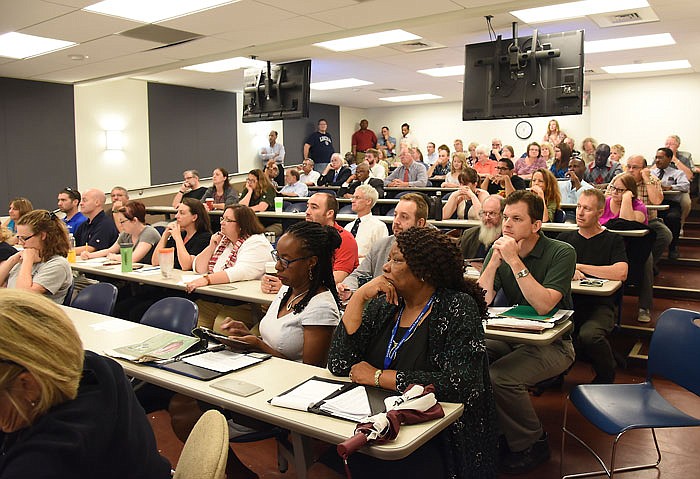Some Lincoln University employees are launching a campaign to organize a collective bargaining unit with the Missouri National Education Association.
NEA said it already has similar units at several Missouri colleges, including Harris-Stowe State University, St. Louis; East Central Community College, Union; Kansas City's Metropolitan Community College; and the St. Louis Community College.
Sociology and criminal justice professor Abdoulaye Bah told LU's Faculty Senate on Thursday he's acting as a spokesman for the group.
"I volunteered to be the person passing this information out because of my seniority at this institution," Bah explained, "and because I think Dr. Rome (LU President Kevin Rome) and Dr. Sewell (Provost Said Sewell) know that I care about this place - so this is not being done as a mischievous behavior."
Rome told the News Tribune Thursday afternoon he had no comment on the discussion at this time.
If faculty members approve the idea, Bah said, "The goals of collective bargaining would be to achieve shared governance - meaningfully, practically, tangibly, not just in words."
LU's rules and regulations already include a Shared Governance concept where faculty are supposed to have input with the administration about school operations and academic offerings.
But over the last year, more than a few LU faculty members have said during Faculty Senate meetings, they feel their voices and their opinions are being ignored by Lincoln's administration and by the board of curators.
Bah said those seeking to organize union membership for the faculty also see it accomplishing goals of "transparency for transactions that are done at the institution, including the budget, finances and other things like we used to (and) professional respect."
Another goal, Bah said, would be the recruitment and retention of a diverse faculty, meaning "diversity in all of its terms - gender, ethnicity, socio-economic statuses, disadvantages - so the definition cannot be narrowed to some ethnicity only."
Numerous pledge cards already have been signed, Bah announced, asking Lincoln hold an election on the question of bargaining.
The MNEA said college faculty aren't covered by any specific state law, but other groups are required to get those request cards from at least 30 percent to one-third of the group being asked to unionize.
Lincoln has more than 150 faculty members.
If they submit enough cards, MNEA officials and Lincoln administrators would negotiate the timing and conditions for holding a vote.
A simple majority of the vote - not of the total number of eligible voters - is required to form a union bargaining unit.
"The point is that the people voting will determine this," Bah said.
Even if the majority voted for the bargaining unit, he added, union membership won't be required.
Under Missouri law, even if they form a bargaining unit, public employees cannot strike.
Bah noted "this fight is not really for me personally," because he plans to step down as department head at the end of this school year and may retire a year after that.
He added: "This fight is for this institution, for it to move forward (so) we can look back and see it thriving, being the Lincoln that we all love."
He encouraged people with questions to contact him.
Turning his back to the audience and raising his arms outward, Bah noted he was willing to take any pressure his volunteer role might generate.
"My back is very large," he observed.
Faculty Senate Chair Bryan Salmons noted the discussion was presented as an information item, and the Senate took no vote for or against the idea.
"I agree with my colleagues that, regardless of what happens with (union) organization, the Faculty Senate needs to remain neutral," Salmons said. "The reason for that is, in my mind, if someone is disinclined to join the union, I don't want them to feel, 'Now I have no representation on campus, whatsoever.'"
Salmons, who also is head of Lincoln's English department, said the Faculty Senate "is for all faculty, period."
If LU's faculty vote to join a union, Salmons said, the bargaining unit would have different responsibilities and duties from those of the Faculty Senate - even though there might be some overlap.
For the Senate, he said, faculty unionization might "put us in a more empowered position," no matter who is in Senate's leadership.

